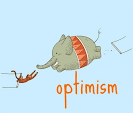 August is over. Vacation time is over as well. It's time to go back to work, at least for me. I'm trying to find out what is the post-vacation syndrome and how to cope with it. I'm affraid I have no choice but deal with it.
August is over. Vacation time is over as well. It's time to go back to work, at least for me. I'm trying to find out what is the post-vacation syndrome and how to cope with it. I'm affraid I have no choice but deal with it.Why employees are called (human) resources?
It’s OK with energy resources. It’s OK with financial resources as well. It’s OK even with natural resources.
But man... we are not resources, we are human. So why we call ourselves human resources?
I do share opinion with Ron Lubensky and Rol Fessenden.
Have you read Unshrink? I've found the following text here, and says:
The theme of the book is basically that most people of today are shaped into a misform - or shrunken! - by our surrounding working civilization: We define ourselves in terms of what we do or how much we earn and in what way we weight certain job-situations above others. In that way we are shrunken, because if we are merely workers then we are like ants - small and without own goals. We must therefor unshrink ourselves, be people.
One of the authors wrote "Because we are not resources" in his dedication to me and that easily summarize the viewpoint of the whole book. I will agree to that statement and also to the book thesis - if we really define ourselves only in terms of our present job, then we really has a problem.
While I do sympathize with the book I have some regrets about its form. The book is published in UK but the style is directed towards american readers, especially the first chapter. That is really terrible written, I must say! The style can be found in about hundreds of self-proclaimed "heal-yourself" guru-books poured out from the USA and they have all the same "we-know-better" way of talking. I have found the same attitude in New Way religious pamphlets and I loathe that style! To demonstrate what I mean, I have just picket at random the following sentences: "There is more to you than you know. More to me than I know. Isn't that exciting?..." - That is badly written: "Isn't that exciting?" The answer could easily be a sarcastic NO IT ISN'T !
Another irritating thing is the insertion on almost every second page of a catch-phrase written in bold typeset and with a bigger font, phrases like the one here: "BUT MOST MANAGERS BELIEVE THAT THEY ARE SUCCEEDING." These phrases can be used if the authors are adressing the audience in a oral way - you can SHOUT the phrases to the people LISTEN TO THAT. They are directions to the speaker, but they do no good to the book.
What is good are the table-like constructions (suggestions for considderations) and the very good notes at the end of the book. And after we have tolerated the first pages of religious sounding sentences then the book actually unshrinks itselfs and become quite good and thought-provoking. My own thoughts was directed towards Alvin Toffler's "The Third Wave" - the Unshrink book is a Read.Me-book or entry level manual for us who want to catch the wave. I am sure that many would benefit from reading the book.



